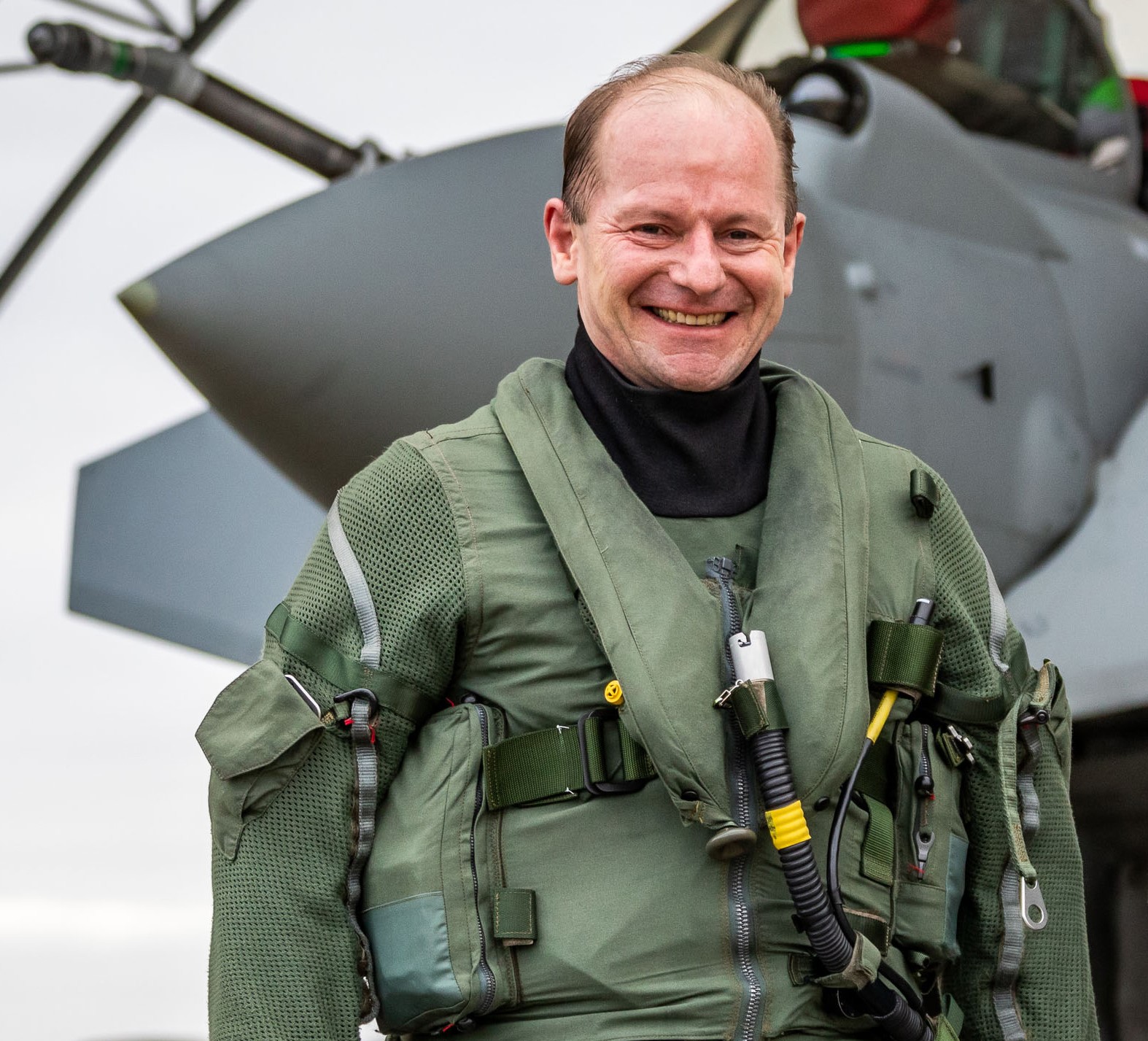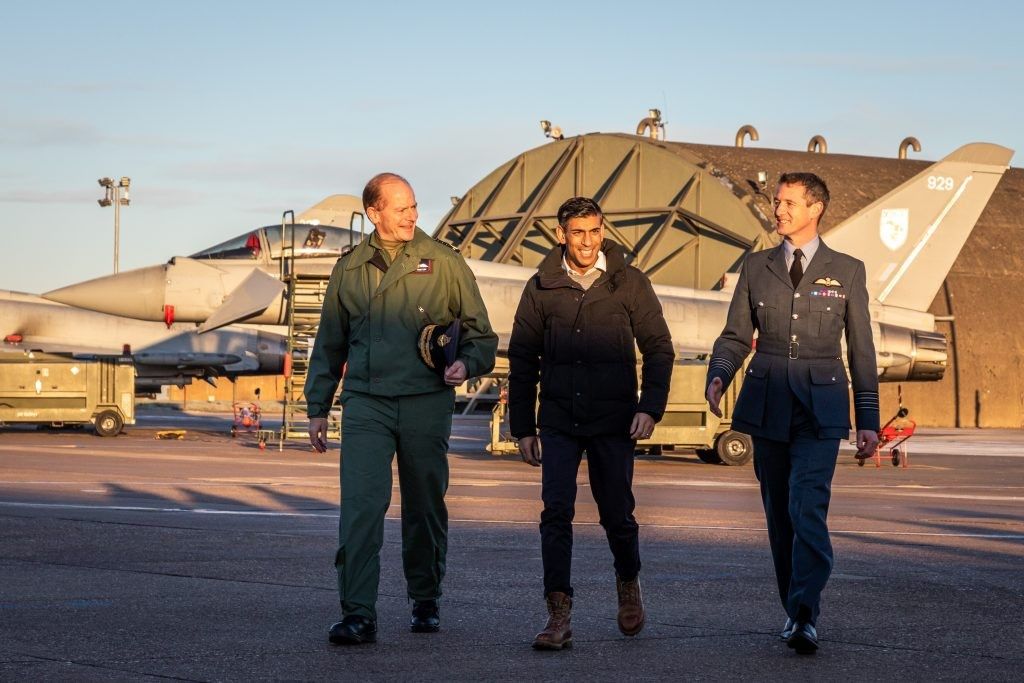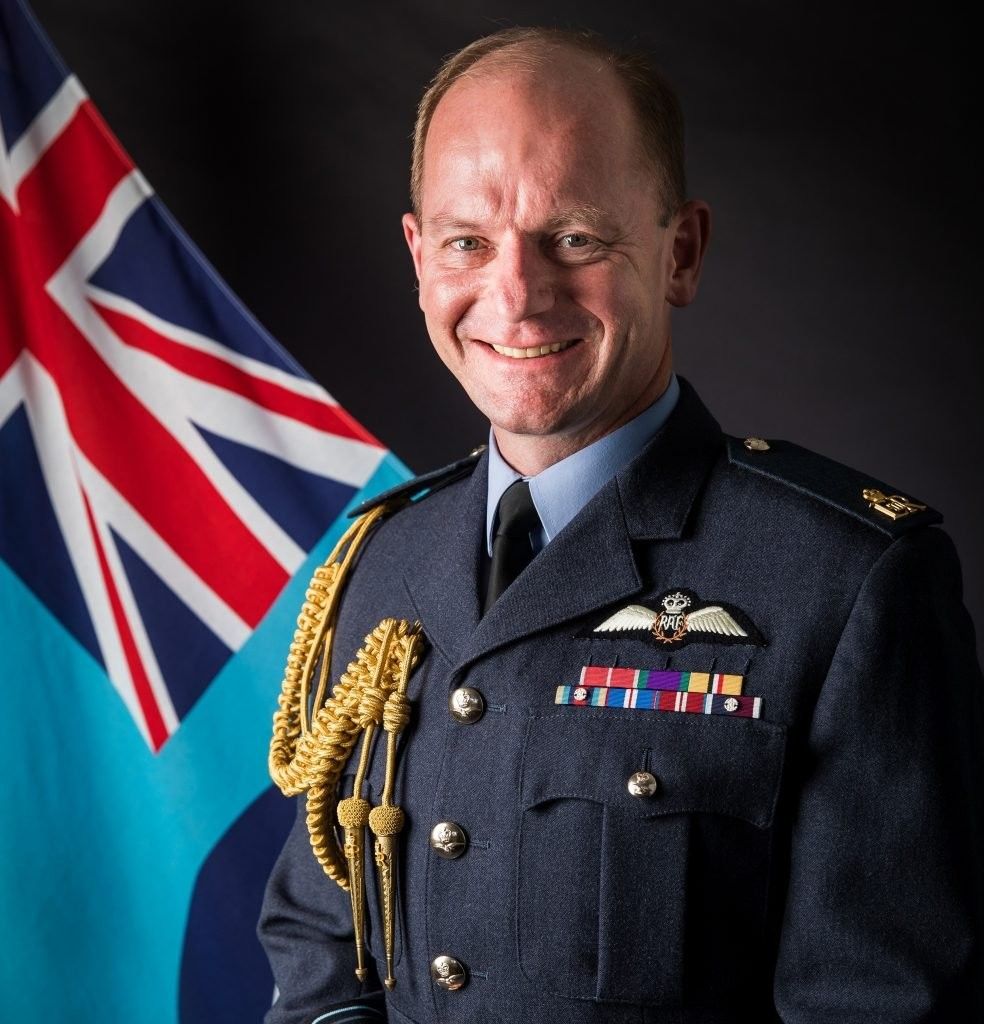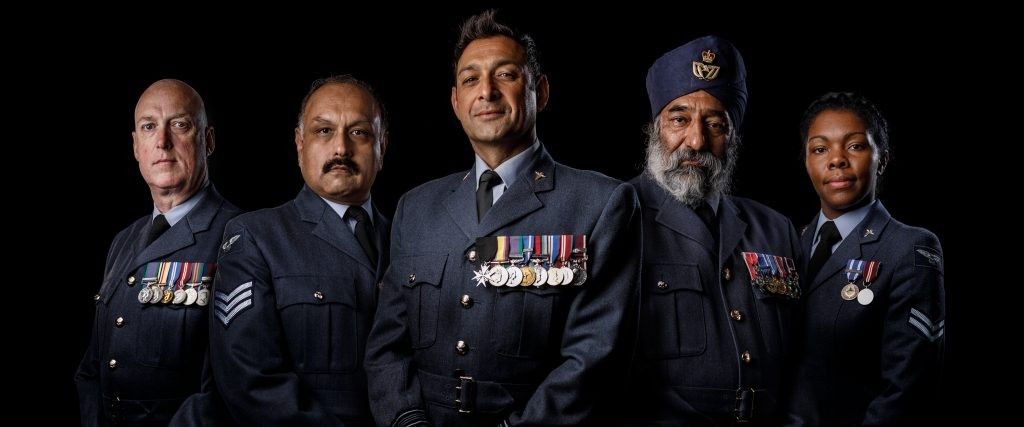- Wednesday, April 24, 2024

By: SHAILESH SOLANKI and SAILESH RAM
FROM where Sir Mike Wigston sits, he can see the most famous address in Britain – 10, Downing Street.
“It’s good I can see what’s going on,” he says with something of a wry smile, showing Eastern Eye his impressive office.
Mike Wigston is how he was born, but today there is a sign on his office desk that reads Air Chief Marshal Sir Mike Wigston KCB CBE ADC.
He is the professional head of Britain’s Royal Air Force (RAF), and the man either prime minster Rishi Sunak or defence secretary Ben Wallace would go to if they had questions about the RAF and its capabilities both at home and abroad.
Sir Mike, 54, has been the chief of air staff since July 26, 2019, and reports to the chief of defence staff, Admiral Sir Tony Radakin KCB ADC.
Britain was the first country to have its own independent air force and it is still highly regarded around the world.
Sir Mike has risen through the ranks – he secured an RAF cadet scholarship which saw him read Engineering Science at Oriel College, Oxford.
He tells Eastern Eye he always wanted to be a pilot. “For as long as I can remember, I was fascinated by aircraft, and that fascination as a six- or seven-year-old became a fascination with being a fast jet pilot. I was fortunate enough to have the ability to do that.”

He grew up near navy bases in Portsmouth (the headquarters of the Royal Navy) and Portland in Dorset. Both had (at that time) ships that had fighter jets and helicopters attached to them, though Portland is no longer a naval base.
“I was aware of aeroplanes because of the Navy bases,” says Sir Mike.
“One of my first memories was going to the Royal Navy Fleet Air Arm Museum in Somerset, and I can still remember the smell and the experience (of going there). It sparked my excitement and that turned into a vocation,” he adds, explaining what motivated him to continue to pursue a career in the RAF. He has no immediate family in the air force, but he comes from a Navy family – his father was a Petty Officer.
“They were very supportive,” he says, of his family. “My father, to his credit, told me to join the RAF – they had more planes.”
Sir Mike was in active service in Iraq and Afghanistan earlier in his career. He says much of his operational flying experience came while policing the no-fly zone over Iraq during the 1990s, when its leader Saddam Hussain was threatening much of the Middle East – he had invaded and then had been repelled from Kuwait.
“There were missiles and attempts to shoot us down and that was my grounding as a pilot,” he reveals.
Later, he found himself assisting in the reconstruction of Basrah International Airport and enabling pilgrims from Iraq to go on Hajj after the turmoil of the Gulf conflicts.

In Afghanistan, Sir Mike spent a year on the ground there and then worked with NATO air forces, helping to build the Afghan Air Force and working with communities in that country. It was part of his role too to assess claims of civilian casualties, and Sir Mike says he went out to communities to establish whether errors had been made.
“The Taliban insurgents had no qualms at all about using civilians as decoys or hiding behind them, and it brought home to me the tragedy of what was happening in Afghanistan,” he tells Eastern Eye.
He says the withdrawal of US and UK forces in August 2021 was difficult, and that much was unplanned and not thought through extensively.
“We did everything we could to maximise the number of people we could take out. And now those people are settling into the UK – so you know in that narrow regard, I look on it as a success, giving new hope to people who had lost everything.”
What really comes across is Sir Mike’s commitment to modernisation, whether that is to do with equipment, personnel or diversity. In his role, he has to make decisions about everything that happens in the RAF, such as what sort of aircraft the service should have.
Inevitably, there are difficult decisions and he knows the RAF leaders of the future rely on him making the right ones.
Sir Mike is most passionate about diversity and his commitment to it has been quite relentless.

Currently, the RAF is behind the Navy and Army when it comes to ethnic minorities serving in Britain’s armed forces.
The RAF has 1,190 people who identify as minority ethnic working within its ranks – this is 3.7 per cent of its total workforce. The Royal Navy has 1,660, which is five per cent; and the Army has 11,390 and a percentage total of 14.4 per cent.
The Army is the closest to the national average of ethnic minorities in the UK population as a whole, which is about 15 per cent, according to the latest census information from last year.
Sir Mike has gone on record saying that he would like to see about 20 per cent of the RAF’s intake in 2030 to be from ethnic minority communities.
It is clear from speaking to him that this is just not about ticking boxes or fulfilling quotas drawn up by bureaucrats and largely disbelieved and disregarded by the top brass. There are too many organisations already like this – good at the talk, but very little else when it comes to changing culture, prejudice and outdated systems of recruitment and retention.
Sir Mike really means what he says – and it is very refreshing.
“It’s a very unpredictable world we live in,” he tells Eastern Eye. “The brutal and illegal invasion of Ukraine just confirms that. All of the evidence points to more diverse teams being better able to cope with uncertainty and unpredictability.
“Diverse teams are more innovative, they are more agile, they are more engaged, they make better decisions, they make fewer bad decisions. And as we look to the evolving threats of the future, threats that we can’t even predict now, the diversity of the Royal Air Force becomes mission critical.”
The business case for diversity has been well-established for more than a decade – teams that are made up of people from a similar culture and background simply get left behind.
In the commercial world, when customers look, talk and behave in quite different ways and companies don’t respond to any of that; and more importantly, don’t know how to change, they will go out of business. It is as is simple as that.
Now, while the RAF is certainly not a business, the group dynamics are similar to large corporations, so if there are people of just one ethnicity, one class, and mainly one gender too, there is little room for innovation, creativity and foresight. Crudely, they will get stuck in the past.
In recent times, many businesses have begun to understand the importance of responding to what is happening out there in British society – significant numbers are born outside the UK, people may have grown up elsewhere and English is not their first language.
Equally, there are new generations of people as British as daisies in a Somerset or a Highland field, but whose heritage is mixed or who have family histories that relate directly to slavery and/or Britain’s colonial history.

Sir Mike, like many in government and leadership roles throughout the country, understands this and feels if Britain is to thrive and prosper, it must be inclusive and forward-looking. So having a diverse and more gender-mixed RAF is part of an important change.
“It’s a cut-throat recruiting world environment that we face, and it will only get more ruthless in the future, particularly for the sort of people we need to recruit – those who have technical, engineering and cyber skills that are highly sought after in the wider employment market,” points out Sir Mike. “I need the RAF to be attractive to talent from every part of the UK employment pool.
“And when I look at the demographics and the way the employment pool is changing, our analysis is that by 2030, 25 per cent of 17- to 25-year-olds will be from ethnic minorities. So, if we don’t start moving the dial now, if we don’t start making a big inroad into our ability to attract and retain young, talented people, then it will become even more difficult for my successor.”
Sir Mike’s immediate boss, Admiral Sir Tony Radakin, was blunt when, in his first speech just days into his appointment in December 2021, he assessed the British armed forces’s attempts at diversity, as “woeful” to date.
In his speech to the Rusi thinktank, Sir Tony said British forces simply had to be do better and that in aspects of leadership, the country would be let down, unless it fixed its ability to recruit both women and ethnic minorities in the numbers that it should.
He said: “That (referring to improvements) includes reflecting the diverse nation we serve. Because if we don’t, then quite simply, we risk looking ridiculous.
“It is about woefulness. The woefulness of too few women. The woefulness of not reflecting the ethnic, religious and cognitive diversity of our nation.”
Sir Mike is in tune with his boss – “I completely agree with him,” he tells Eastern Eye.
At that time, Sir Tony was also responding to the scandal of a senior army officer claiming expenses to pay for his children’s school fees and perhaps, far more disturbingly, the sheer number of women who had told a parliamentary report in June of 2021 that two-thirds of all women in the armed forces had experienced bullying, sexual harassment and discrimination during their time in the services. In relative terms, on gender recruitment, the RAF is doing better than the army or navy, Sir Mike proudly asserts.
“We are actually best in class in defence for gender,” he says. “And there are some things we are doing with gender diversity of which I am incredibly proud, both in terms of progressing women into the most senior ranks – the proportion is growing – and in the number of women we recruit who are staying in the service.”
The RAF has improved its gender intake numbers, from 15 per cent to around 18 per cent women this year, but Sir Mike accepts that compared to the US Air Force or Australia, Britain is lagging behind.
The position on ethnic minorities is much worse, and he accepts it has to change. Sir Mike has presided over a doubling from just four per cent in recruitment to around seven to eight per cent.
“I’ve really energised this and really turned up the dial on recruiting over the last five years,” he says.
But the fact is that for this figure to hold, ie, for that eight per cent of recruitment to go on to reflect as eight per cent of the RAF itself, he has to retain those new recruits.
“We need to do better,” he says. “We need to find out how to make ourselves more attractive, how to make young ethnic minority men and women look at the RAF as an attractive career choice.”
Sir Tony has gone on record saying that the armed forces should be about 30 per cent women and 20 per cent ethnic minority by around 2030. That is a very large leap for both measures, and while there has been some success on gender, the position of ethnic minorities has not changed significantly.
Why was that, Eastern Eye asked?
Sir Mike says it is partly down to local recruitment. The RAF has tended to do its hiring close to its bases – many are in rural areas and in Lincolnshire and Yorkshire – and it needs to go out into communities where people don’t know about the opportunities available in the RAF.
There are also few senior officers who Sir Mike can point to as role models to make his case. There are fewer than five Air Commodores and a similar number of Group Captains, 20 Wing Commanders and 30 Squadron Leaders from ethnic backgrounds in the service. He admits that having just around two per cent of the senior leadership from a minority ethnic background makes it difficult for the RAF to take its case, in person, to communities who might be interested.
The biggest number of personnel are Air Specialists, this being the new name for junior members of the RAF.
Sir Mike is clear that the organisation needs to do more to retain those that it does recruit from diverse backgrounds. He feels that with gender, the RAF has “moved the dial meaningfully”, and it must do the same with ethnic minorities.
He says the service is looking at the way it identifies talent and nurtures it to assume leadership roles. In the main, these have been unconsciously slanted towards white men and he accepts and realises that the pipeline for identifying and developing talent has to be bigger and more inclusive.
“We’re looking at different options for people from different backgrounds and looking at the best coaching pathways for them. It’s an area where we have been much more active and designing it around gender, diversity and inclusion.”
He says flexible working is part of this new talent scope programme, where those looking to get on can also do so through flexible working.
“It’s not just attractive to gender groups, it’s attractive to all sorts of groups.”
Sir Mike reflects that the equality, diversity and inclusion agenda is still very much evolving, but he feels it won’t be more than a decade before a female heads up one of the three services. As far as that person being from an ethnic minority, he believes it is likely to be decades, but very much hopes he has pushed the RAF firmly in the direction of an ethnic minority officer heading the service.
Sir Mike is set to retire in a few months and realises he is not going to be replaced by an ethnic minority RAF chief.
“I engage regularly with our ethnic minorities network. And I don’t say this as a boast – but they are nervous, because they have seen diversity as a priority over the last four years. I am very keen to communicate to leaders coming after me that there is a really important confidence-building conversation to be had with all our minority groups, not just ethnic minorities.”
Sir Mike’s varied responsibilities
AS THE Air Chief Marshal (ACM), Sir Mike Wigston’s responsibilities are as wide as they are challenging.
Sir Mike, who is married to a solicitor and has two adult children, sees the role split into three main areas.
The first as head of the Royal Air Force (RAF) is to offer strategic military thinking – what the RAF should look like in 10, 20, 30 years’ time – and to discuss this with his colleagues in the Army and the Navy, as well as the political leadership in terms of the country’s overall aims, objectives and strategic considerations.
Another part of Sir Mike’s role is being like a CEO, the person in charge of 35,000 people and a budget of about £1 billion every year.
The third element is being a custodian and preserver – and with retirement looming next year for him, a legacy.
“I am temporary custodian of a national institution, the temporary head of the tribe, if you like, and all that goes with the role. It’s about veterans, our service families, it’s about our amazing air cadets and young people thinking about joining.”
And allied to this is the ceremonial and ambassadorial role. Sir Mike has to attend services and parades. “It’s a very significant part of the role,” he admits.
In his spare time, Sir Mike enjoys sailing, although he says that in recent years, he hasn’t had as much time on the water as he would have liked.
Want to be a fighter jet pilot?
FOR many young girls and boys, the idea of being a jet fighter pilot is a dream – but for Air Chief Marshal Sir Mike Wigston, it turned into his reality.
As a young boy, he was taken with flying and machines and being in the sky, and later serving his country through what many still see as a noble calling.
Sir Mike, who trained as a Tornado pilot, says the RAF offers several pathways for people who want a varied and stimulating career, and have a strong sense of doing their bit for their country. “This is an amazing organisation,” he tells Eastern Eye.
“We offer an exciting and rewarding career.”
For those who want to go to university and be sponsored through the RAF, that is possible, he reveals.
Most of all, Sir Mike emphasises there is a varied range of careers one can choose within the RAF.
“For everybody that serves our organisation, there is the satisfaction of doing a job on behalf of the nation and a sense of fulfilment that there is in the delivery of air and space power to protect our nation.”
Anyone coming out of a high school education should consider whether a life in the services, especially the RAF, might be for them.
“I would absolutely draw any young person’s eyes to this. There are so many different strands of our organisation from being a pilot or being a space systems operator or a chef to an RAF regiment to protecting our country and its air bases.”
‘First tech start-up in 20th century’
SIR MIKE WIGSTON believes the RAF was essentially a new organisation created to harness technology to serve the skies above the country – both keeping Britons safe and allowing them to help other countries as well as carry out the nation’s strategic objectives.
It also has another role that has not been highlighted in recent times, but which Sir Mike believes is important to reiterate. “The RAF was the 20th century’s first tech start-up – they were tapping into this amazing discovery and looking to maximise the unlimited potential of this new technology – flying,” he says.
Basically, the RAF was behind inventions that people now take for granted and which are widely deployed in civil aviation. Often developments and breakthroughs come from the military and filter out into the world, Sir Mike reminds Eastern Eye.
“We invented the jet engine, the miniaturised radar, the first radar network, and other amazing machines around the turn of the century. It was that inventive spark.”
He very much would like to see that pioneering and creative spirit return to the organisation, and is promoting it among young people interested in creativity
and technology.
“Innovation and disruption are in our DNA and I’ve been trying to re-energise that.”
![]()